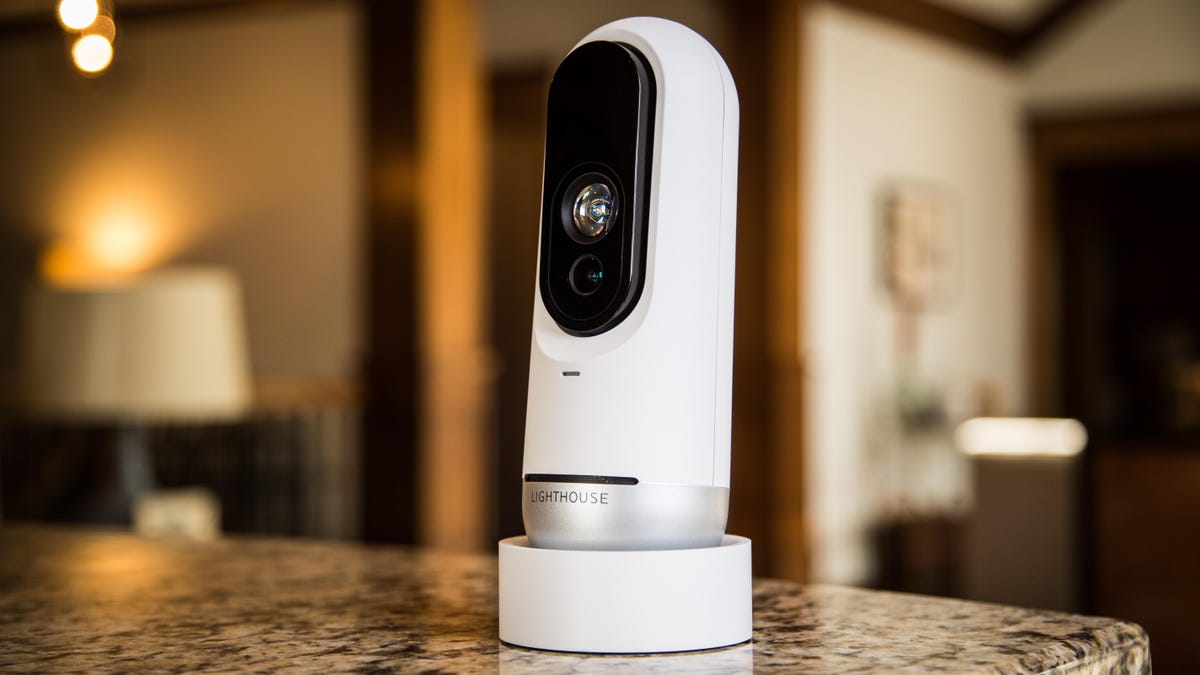 Why You Can Trust CNET
Why You Can Trust CNET Super sight helps these connected cams do more than just watch
One sees through walls. One knows you by your skeleton. Several recognize faces. The next generation of smart home cameras is here.

Smarter smart home cameras
Connected cameras can make a nice addition to your smart home. They typically watch for motion and let you check on your place remotely with an app.
Cameras such as the pictured Lighthouse go a step beyond the ordinary Wi-Fi cam. Modern smart home cams are starting to use extra senses to be better sentries.
Lighthouse Interactive Assistant
Complete with a 3D sensor, the $300 Lighthouse Interactive Assistant knows the difference between people, pets and objects. It even senses actions such as running. To top it all off, the Lighthouse app features an intuitive digital assistant that lets you pull up clips or set up notifications just by asking.
Netatmo Welcome
One of the first cameras with facial recognition, the $200 Netatmo Welcome could learn you and your family by sight and let you know if it saw strangers.
Netatmo Presence
Netatmo's outdoor security cam doesn't recognize faces, but the $300 Presence can tell the difference between a car, a person and an animal.
Nest Cam IQ
Nest has been at the forefront of smart home cams for awhile with the $200 Nest Cam. The Nest Cam IQ is taking the smarts one step further. It'll send you a unique alert when it sees a person. It can also recognize faces.
Nest Cam IQ Outdoor
The $350 outdoor version of the Nest Cam IQ also recognizes people and faces.
Nest Hello
Nest's upcoming doorbell, the Nest Hello, will also sport facial recognition.
Canary View
Like the original $170 Canary all-in-one, the $100 Canary View can customize alerts based on when it sees people. You won't get false notifications when it picks up footage of shadows or pets anymore.
Canary Flex
The $200 Canary Flex also differentiates people from objects.
Cherry Home
Cherry Labs Cherry Home goes way beyond recognizing faces. The sensors map the room, and actually get to know you by your skeleton.
It learns the length of your arms and legs. Cherry Home even learns the sound of your voice and knows your position in the room. It'll use this info to determine if you've fallen or even if you're having a stroke.
The ambitious Cherry Home system will start at $900 once it's ready for launch.
Cherry Home's sight
Here's how Cherry Home recognizes people. Its sensors send that information to a separate processor that works through all of the data locally without needing the cloud.
Vayyar
Vayyar doesn't even use a traditional camera lens to keep watch over your home. Instead, the upcoming gadget from a startup of the same name will use 3D sensors and radio waves to determine the position of people in a room. It'll be able to tell if someone is sitting, standing or lying down, so it can send an alert if someone falls.
Vayyar's vision
Vayyar can detect people through smoke and even walls.
Tend Secure Lynx
The Tend Secure Lynx might not have as many features as some of the other cameras on this list, but it has facial recognition and only costs $60.

